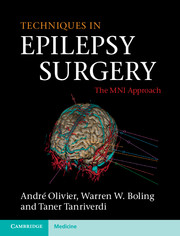Book contents
- Frontmatter
- Contents
- Acknowledgment
- Preface
- 1 History of epilepsy surgery
- 2 The search for the epileptic focus: investigation of the surgical candidate
- 3 Surgical anatomy
- 4 Neuronavigation and preoperative brain mapping
- 5 Stereoelectroencephalography (stereotactic intracranial recording)
- 6 Anesthesia and awake procedure
- 7 Peroperative brain mapping
- 8 Endopial resection (intervascular endopial gyral emptying)
- 9 Surgery of temporal lobe epilepsy: cortico-amygdalohippocampectomy
- 10 Surgery of temporal lobe epilepsy: transcortical selective amygdalohippocampectomy
- 11 Surgery of central area epilepsy
- 12 Surgery of frontal lobe epilepsy
- 13 Surgery of parietal lobe epilepsy
- 14 Surgery of insular lobe epilepsy
- 15 Surgery of occipital lobe epilepsy
- 16 Hemispherectomy
- 17 Callosotomy
- 18 Epilepsy and brain tumors
- 19 Surgical treatment of cortical dysplasias
- 20 Reoperations in failed epilepsy surgery
- 21 Alternative procedures in surgery for epilepsy
- 22 Complications of epilepsy surgery
- 23 Quality of life after epilepsy surgery
- Index
- References
20 - Reoperations in failed epilepsy surgery
Published online by Cambridge University Press: 05 October 2012
- Frontmatter
- Contents
- Acknowledgment
- Preface
- 1 History of epilepsy surgery
- 2 The search for the epileptic focus: investigation of the surgical candidate
- 3 Surgical anatomy
- 4 Neuronavigation and preoperative brain mapping
- 5 Stereoelectroencephalography (stereotactic intracranial recording)
- 6 Anesthesia and awake procedure
- 7 Peroperative brain mapping
- 8 Endopial resection (intervascular endopial gyral emptying)
- 9 Surgery of temporal lobe epilepsy: cortico-amygdalohippocampectomy
- 10 Surgery of temporal lobe epilepsy: transcortical selective amygdalohippocampectomy
- 11 Surgery of central area epilepsy
- 12 Surgery of frontal lobe epilepsy
- 13 Surgery of parietal lobe epilepsy
- 14 Surgery of insular lobe epilepsy
- 15 Surgery of occipital lobe epilepsy
- 16 Hemispherectomy
- 17 Callosotomy
- 18 Epilepsy and brain tumors
- 19 Surgical treatment of cortical dysplasias
- 20 Reoperations in failed epilepsy surgery
- 21 Alternative procedures in surgery for epilepsy
- 22 Complications of epilepsy surgery
- 23 Quality of life after epilepsy surgery
- Index
- References
Summary
Introduction
In general, “surgical failure” is defined as persistent or recurrent seizures following resective surgery. The most important features in the assessment of failed epilepsy surgery are persistence of the habitual seizure type and a seizure-free interval after the initial surgery. In virtually every series of temporal or extra-temporal lobe epilepsy surgery there is a significant rate of failure. In our overall series of cases operated for temporal lobe epilepsy there is a failure rate on the order of about 15%. It is thus important to study these patients particularly to understand why the operation failed and whether a second operation would have an opportunity for success.
The reasons for failure fall into two broad categories: an error in the localization of the epileptic focus itself and an inappropriate modality of resection namely an incomplete removal of the total epileptogenic zone.
Penfield was the first to report that failures in temporal lobe epilepsy surgery could be converted into success by further removal of the mesial temporal structures, that is the uncus and the hippocampus. Since that article, the literature on reoperation has been relatively scarce. The next report from the MNI was in 1988 and 1989. Among 20 patients who underwent a reoperation, 30% were seizure free and 20% had no significant improvement. Subsequently there were papers by Awad et al. and Wyler et al. with their experience in reoperation. The topic was reviewed by Polkey et al. Germano et al. reported the MNI experience in 40 cases of reoperation in the temporal lobe and found 53% of patients were seizure free at a mean of 4.8 years postoperatively. These various studies have shown the definite value of reoperation in well-selected patients.
- Type
- Chapter
- Information
- Techniques in Epilepsy SurgeryThe MNI Approach, pp. 248 - 253Publisher: Cambridge University PressPrint publication year: 2012



